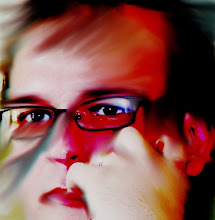 At the very start of "Looper," we're treated to an assassination within a matter of seconds. It's quite startling and goes a long way to establishing both the premise and tone of the film.
At the very start of "Looper," we're treated to an assassination within a matter of seconds. It's quite startling and goes a long way to establishing both the premise and tone of the film.In the new sci-fi thriller, we're introduced to a future where time travel exists, but it's controlled by thugs.
Actually, in this future, time travel does not yet exist, but it will in the future-future. That's right, hope you have your thinking caps on because the plot of this film is incredibly convoluted.
"Looper" takes place in 2044 in an unnamed town in Kansas. A Looper is an assassin who kills people who are sent back in time to face their deaths. That way, the bad guys in the future don't have any messy remains to dispose of.
 Neat, huh?
Neat, huh?
 Neat, huh?
Neat, huh?
And, of course, because the future criminal world doesn't like any loose ends, they have a habit of sending back old guys who used to be loopers to be executed by their younger selves.
And that's where our trouble starts.
Joseph Gordon Levitt plays Joe, an assassin who lives a charmed life filled with violence, drugs and sex, until he's expected to kill his future self, played by Bruce Willis.
And that's where our trouble starts.

Joseph Gordon Levitt plays Joe, an assassin who lives a charmed life filled with violence, drugs and sex, until he's expected to kill his future self, played by Bruce Willis.
The film
also features Emily Blunt who plays a woman whose telekinetic son may or may not grow up
to be a notorious mafia kingpin.
"Looper" is the best mainstream science fiction film since 1998's "Dark City."
It's brually violent and features a complicated, sordid and conflicted anti-hero.














